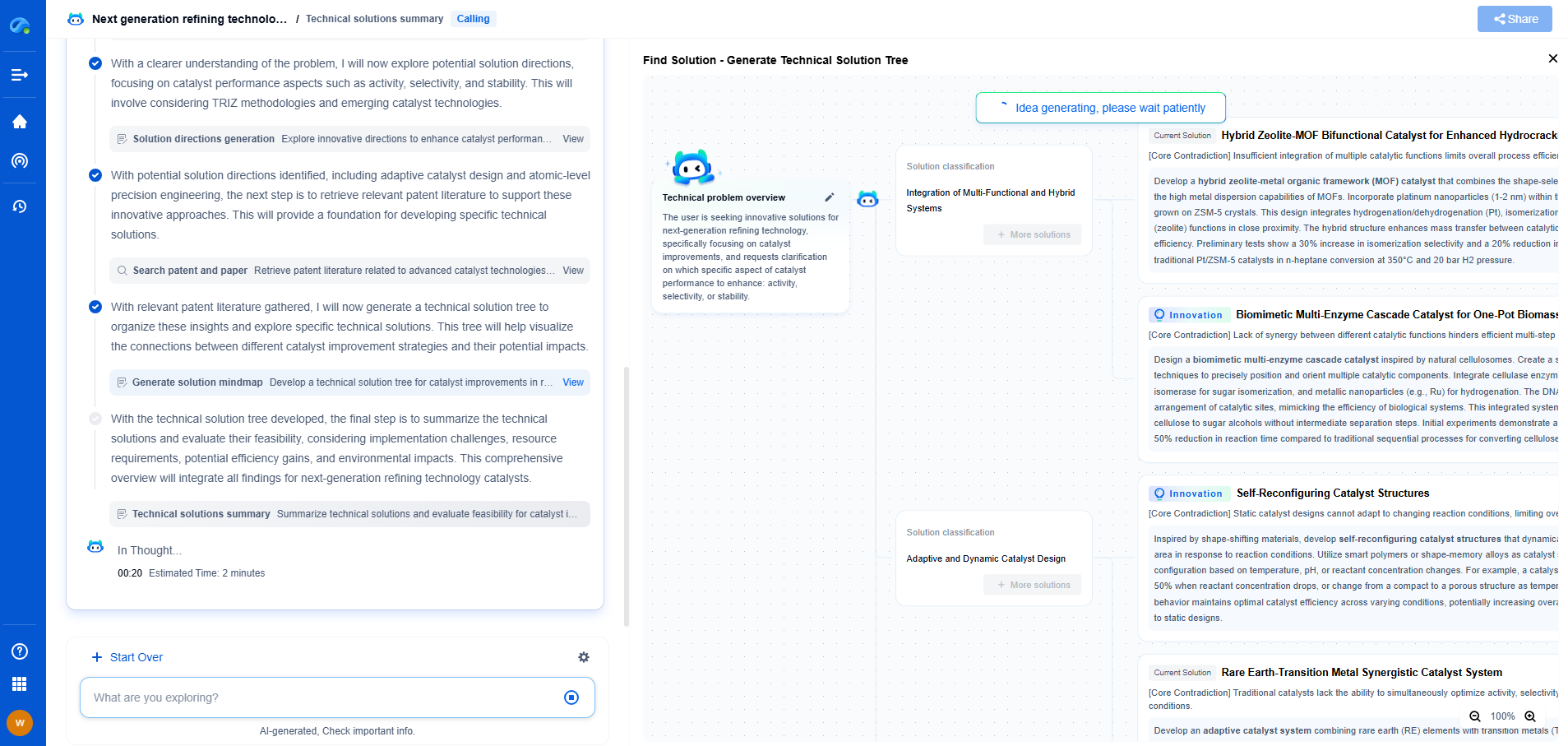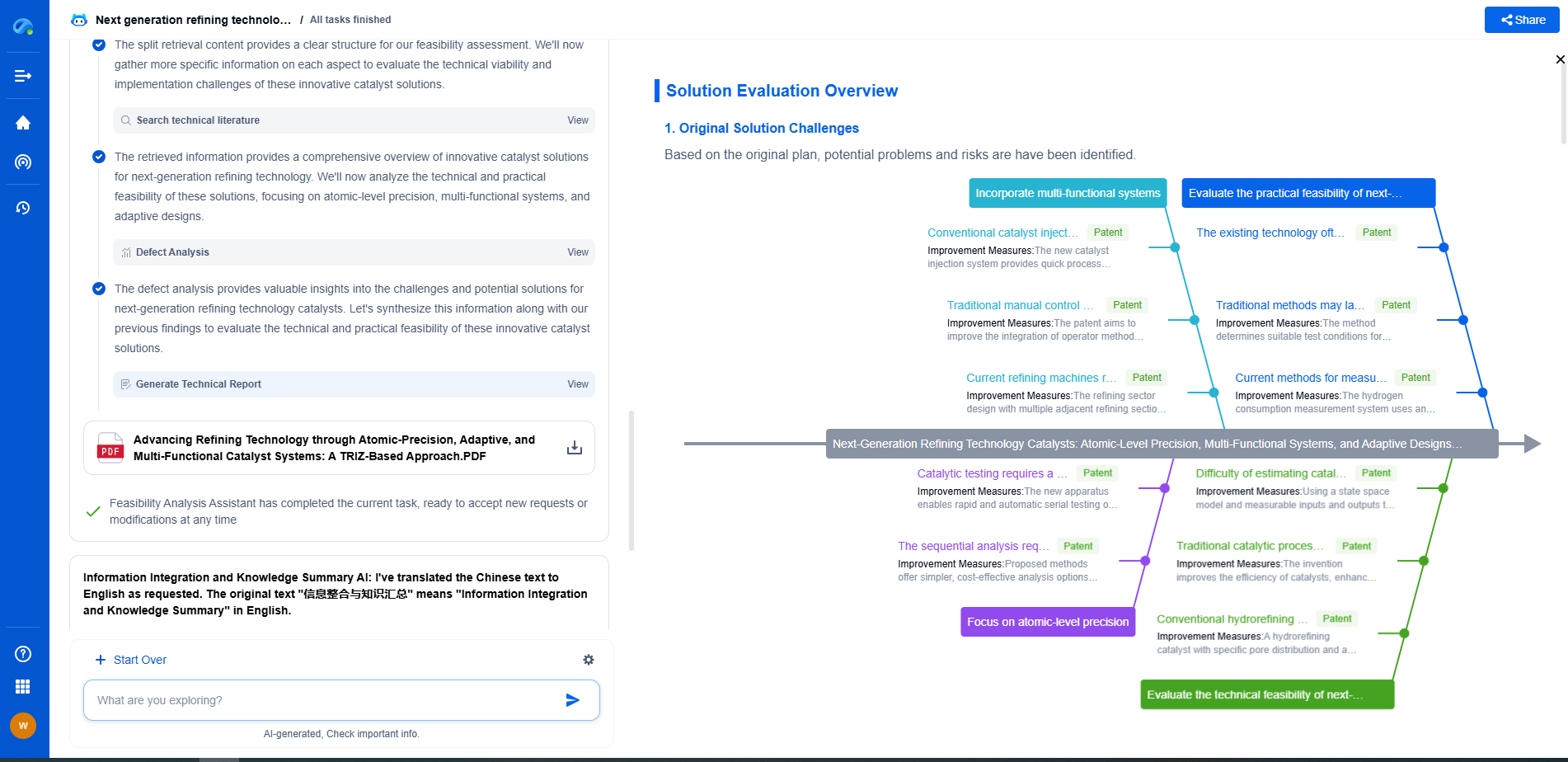What is an intelligent (smart) completion system?
JUN 20, 2025 |
In the rapidly evolving world of technology, intelligent completion systems have emerged as a groundbreaking innovation, revolutionizing the way we interact with software and digital platforms. These systems are designed to predict and suggest the next steps or words a user might need, significantly enhancing user experience by making interactions more efficient and intuitive. But what exactly are these systems, and how do they work? Let's delve deeper into the concept of intelligent completion systems.
The Fundamentals of Intelligent Completion Systems
At their core, intelligent completion systems are powered by artificial intelligence (AI) and machine learning (ML) algorithms. These systems analyze vast amounts of data to understand patterns and predict outcomes. In the context of text, for instance, they can suggest the next word or phrase a user is likely to type, based on the input provided and the context. This is commonly seen in applications like email writing, messaging apps, and code editors, where predictive text features are now ubiquitous.
In programming environments, smart completion systems are invaluable. They can suggest code completions, reduce errors, and speed up the coding process, allowing developers to focus on crafting better software solutions. In essence, these systems are designed to learn from user inputs and improve over time, becoming more accurate and efficient.
The Role of AI and Machine Learning
A significant part of the intelligent completion system's effectiveness lies in its AI and ML capabilities. These technologies enable the system to handle and process enormous datasets, learning from each interaction. Machine learning models are trained on diverse datasets, teaching the system to recognize patterns and make predictions. In natural language processing (NLP), for instance, these models can understand linguistic nuances and context, making suggestions that sound natural and relevant.
Moreover, as users continue to interact with the system, it becomes more refined and personalized. This adaptability is crucial, as it ensures that the system remains relevant and useful to the individual user over time.
Applications Across Various Industries
While intelligent completion systems are perhaps most visible in text-based applications, their utility spans across numerous industries. In healthcare, for example, smart completion systems can assist doctors by suggesting possible diagnoses or treatment plans based on patient data. Similarly, in finance, they can help analysts by predicting market trends or identifying investment opportunities.
Moreover, in customer service, intelligent completion systems can streamline interactions by suggesting responses to common customer queries, thereby reducing response times and improving customer satisfaction. The versatility of these systems makes them an invaluable tool across various sectors, enhancing productivity and efficiency.
Challenges and Considerations
Despite their numerous benefits, implementing intelligent completion systems comes with its challenges. Privacy and data security are major concerns, as these systems rely on large volumes of data to function effectively. Ensuring that user data is protected and handled ethically is paramount.
Additionally, there's the challenge of bias within AI systems, where the data used to train the models may inadvertently reflect societal biases. Developers must be vigilant in continuously refining algorithms to minimize such biases and ensure fair and unbiased outcomes.
The Future of Intelligent Completion Systems
Looking ahead, the future of intelligent completion systems is promising. As AI and ML technologies continue to advance, these systems will become even more sophisticated, offering deeper insights and more accurate predictions. The integration of these systems into everyday technology will likely become more seamless, further enhancing user experiences across all digital platforms.
In conclusion, intelligent completion systems represent a significant leap forward in technological innovation. By leveraging AI and machine learning, they enhance efficiency, productivity, and user satisfaction across a multitude of applications. As the technology continues to evolve, it holds the potential to transform the way we interact with the digital world, making our interactions not just smarter, but also more intuitive and human-like.
Navigating the Complexities of Drilling Innovation? Let AI Do the Heavy Lifting
In an industry where subsurface conditions, materials science, and drilling dynamics evolve rapidly, staying ahead of technical innovation and protecting your intellectual property can be overwhelming.
Patsnap Eureka, our cutting-edge AI assistant, is built for R&D and IP professionals in high-tech industries like drilling technologies. Whether you're optimizing rotary steerable systems, evaluating high-temperature materials, or exploring next-gen automation in directional drilling, Eureka enables real-time analysis of the latest patents, technology landscapes, and competitive movements—all from one intelligent, intuitive platform.
Ready to accelerate your development cycle and make strategic decisions with confidence? Explore Patsnap Eureka today—where smart drilling starts with smarter insights.
- R&D
- Intellectual Property
- Life Sciences
- Materials
- Tech Scout
- Unparalleled Data Quality
- Higher Quality Content
- 60% Fewer Hallucinations
Browse by: Latest US Patents, China's latest patents, Technical Efficacy Thesaurus, Application Domain, Technology Topic, Popular Technical Reports.
© 2025 PatSnap. All rights reserved.Legal|Privacy policy|Modern Slavery Act Transparency Statement|Sitemap|About US| Contact US: help@patsnap.com

